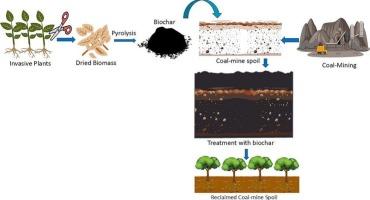Harnessing the potential of invasive plants biomass for biochar production and coal-mine spoil reclamation: A review
Q1 Environmental Science
引用次数: 0
Abstract
The coal mining industry plays a vital role in driving economic growth. However, mining activities generate vast amounts of coal mine spoil, leading to severe environmental degradation. It contains acidic pH, high bulk density, and toxic contaminants, which hinder plant growth. Biochar derived from invasive plant biomass can significantly improve soil properties, including bulk density, water-holding capacity, and the immobilization of contaminants, while also promoting plant growth. Compared to conventionally used biomass, biochar derived from invasive plants exhibits distinct physicochemical properties and contaminant adsorption capacity. Its utilization provides the dual advantage of managing invasive plants and restoring degraded mine land. Research on invasive plant-based biochar is primarily confined to laboratory studies, whereas its application in coal mine spoil reclamation remains underexplored. Moreover, reviews specifically addressing this topic remain scarce, highlighting a critical gap in the existing literature. Therefore, this review critically evaluates the physicochemical properties of biochar derived from invasive plants and its potential for the reclamation of coal mine spoils.

利用入侵植物生物质生产生物炭和煤矿废弃地复垦的潜力:综述
煤炭采矿业在推动经济增长中发挥着至关重要的作用。然而,采矿活动产生了大量的煤矿矸石,导致了严重的环境退化。它含有酸性pH值,高堆积密度和有毒污染物,阻碍植物生长。来自入侵植物生物量的生物炭可以显著改善土壤性质,包括容重、持水量和污染物的固定化,同时也促进植物生长。与传统生物质相比,从入侵植物中提取的生物炭具有独特的物理化学性质和污染物吸附能力。它的利用具有管理入侵植物和恢复退化矿区的双重优势。入侵植物生物炭的研究主要局限于实验室研究,其在煤矿矸石复垦中的应用尚未得到充分探索。此外,专门针对这一主题的评论仍然很少,突出了现有文献中的一个关键空白。因此,本文对入侵植物提取的生物炭的理化性质及其在煤矿废弃地回收中的潜力进行了评述。
本文章由计算机程序翻译,如有差异,请以英文原文为准。
求助全文
约1分钟内获得全文
求助全文
来源期刊

Bioresource Technology Reports
Environmental Science-Environmental Engineering
CiteScore
7.20
自引率
0.00%
发文量
390
审稿时长
28 days
 求助内容:
求助内容: 应助结果提醒方式:
应助结果提醒方式:


